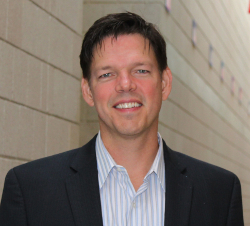 by Dan Vermeer, executive director, EDGE
by Dan Vermeer, executive director, EDGE
PopTech is a unique organization. They call themselves an “innovation network” that connects leading thinkers, artists, activists, and doers to pursue worldchanging ideas. Their topical focus is incredibly broad, covering such issues as violence prevention, eco-materials, public health, new technology, energy, conservation, science, and many others. They run highly regarded Fellows programs on Social Innovation and Science Leadership. The PopTech community is global, lively, talented, diverse. Wouldn’t it be great to bring together this vibrant community for a few days in a gorgeous location, to hear their latest great ideas, find partners to launch and advance new initiatives, and just enjoy the interaction of this fascinating collection of human beings?
That, in a nutshell, is the PopTech Conference, held every year at the peak of fall colors in the beautiful, seaside town of Camden, Maine. Each fall, 700 people from many fields and geographies meet together in a 19th century opera house for 3 days of great ideas and conversation. I attended PopTech this year for the first time, and came back from the event refreshed and inspired.
Some of the highlights for me were:
- Alan Rabinowitz, known as the “Indiana Jones of Wildlife Protection”, gave a passionate talk about his life-long commitment to help protect the big cats of the world. Working in Burma, Latin America, and many other parts
of the world, Rabinowitz has developed a set of strategies that have dramatically improved the prospects for big cats in their natural habitats. The keys to his approach are: 1) to preserve large tracts of land to accommodate the large territories of the animals; 2) to build connections between protected areas that can serve as corridors for animals to move long distances; and 3) developing a model of conservation that includes human inhabitants, not excludes them.Rabinowitz’s story was so compelling because he shared his experience as a child, when he suffered severe stuttering problems. His speech impediment led him to avoid human contact, and to seek out silent interaction with the animals at the zoos near his New York home. As he became more committed to these animals, he made a pact to do everything he could to save these animals from the constant threats of human beings. But his many years as a conservation activist has convinced him that human societies have to be deeply integrated into conservation strategy if they are to be effective in the real world. Rabinowitz’s enthusiasm, his lifetime of productive and thoughtful work, and his ongoing frustration that we are “losing the conservation battle” brought PopTech to its feet.
- Duke’s own Dan Ariely gave a great talk on “hedonic adaptation,” or what some people call the hedonic treadmill. The basic idea is that people quickly adjust to either positive or negative experiences by quickly returning to a basic level of happiness. The rush associated with positive experiences wears off fast, but so do the blows of loss or pain. We adjust to the “new normal.” As usual, Dan provided great personal anecdotes that demonstrated this principle, related to the pain he suffered from severe injuries he sustained in an explosion. He also provided a fascinating analysis on how people understand their place in the social pecking order–for example, selecting dating partners who are relatively similar to themselves in attractiveness. The point of these stories, relative to the conference theme, was that adaptation sometimes fails. People become accustomed to their environment and miss important signals. In particular, we fail to notice when change in our environment happens gradually, even if it ultimately results in a dramatically different situation. While he didn’t draw the analogy directly, there certainly seems to be adaptation at work in society’s inaction on critical issues, whether it is poverty, or the degrading infrastructure or climate change. It’s not much different than yesterday, but it’s much worse than it was in the past. Our minds convince us that everything is all right, even if it isn’t.
- Continuing the themes of the day, several presentations highlighted how we often think wrong about our situation. In the world of international aid, Kevin Starr from the Mulago Foundation discussed several examples of exciting new approaches to development problems that failed miserably in the real world. For example, the Lifestraw was designed to allow people to drink filthy water through a large tube that purified the water when the person sucked on it. Unfortunately, the Lifestraw took a lot of time and pressure to produce useable water, and hadn’t really grappled with the fact that people don’t like to stick a straw in a dirty puddle to drink. After demonstrating a few classic failures of aid, Starr described a few simple principles for evaluating any initiative: 1) Is it needed?; 2) Does it work?; 3) Will it go to those who need it?; and 4) Will they use it? It is amazing, in 20/20 hindsight how few interventions have solid answers to these questions.
These are only a few of the highlights, and even that from only the first day. PopTech is an amazing event, and difficult to summarize. Spend some time getting to know it at: http://www.poptech.org/. You will be glad you did.